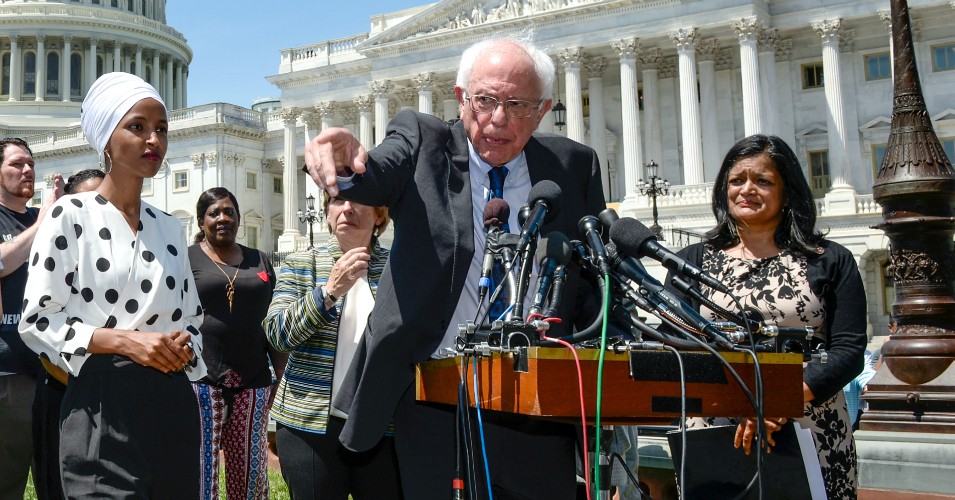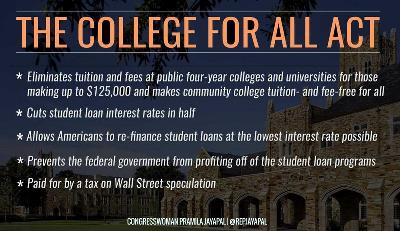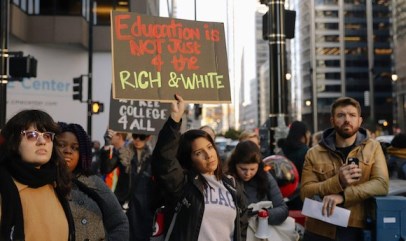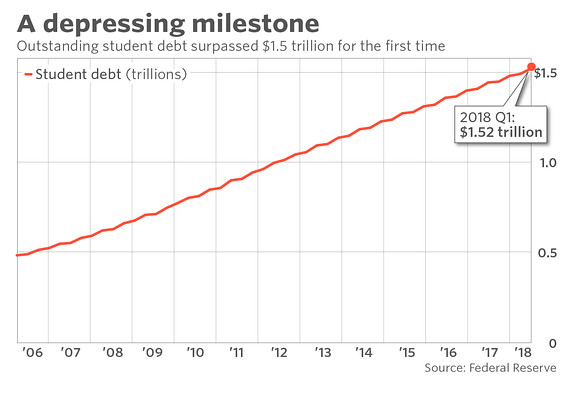
Sen. Bernie Sanders (I-Vt.) holds a news conference to discuss major college affordability legislation in Washington on Monday June 24, 2019. Co-sponsors, Reps. Ilhan Omar (D-Minn.) and Pramila Jayapal (D-Wash.) flank Sanders (Photo: Caroline Brehman/CQ Roll Call)
“In the face of this crisis, nothing short of a complete overhaul of our public higher education system will suffice.”
“We must treat education as the public good that it is. That means making public colleges and universities tuition-free, just as public K-12 schools are today. It also means hitting the ‘reset button’ on student loan debt.”—letter
June 26, 2019
![]()
More than 100 academics endorsed Sen. Bernie Sanders’s tuition-free college and debt cancellation proposal on Wednesday, hailing the plan as the kind of ambitious solution that is needed to tackle soaring higher education costs and provide relief to the millions of Americans drowning in student loans.
In a letter to Congress first obtained by The American Prospect, a mix of education, economic, and legal experts said Sanders’s College for All Act “would benefit the entire economy, improving life not only for those who will feel immediate relief as borrowers, current students, and their loved ones.”
 “To some, this will appear too radical. To us, it is the bold solution we need,” the academics said of the bill, which Sanders—a 2020 Democratic presidential candidate—introduced in the Senate Monday alongside Reps. Ilhan Omar (D-Minn.) and Pramila Jayapal (D-Wash.), who unveiled similar legislation in the House.
“To some, this will appear too radical. To us, it is the bold solution we need,” the academics said of the bill, which Sanders—a 2020 Democratic presidential candidate—introduced in the Senate Monday alongside Reps. Ilhan Omar (D-Minn.) and Pramila Jayapal (D-Wash.), who unveiled similar legislation in the House.
The group of experts—which included Columbia University economics professor Jeffrey Sachs, Stony Brook University economics professor Stephanie Kelton, and Ohio University public affairs professor Darrick Hamilton—said the “unimaginable 3,819 percent” rise in the annual cost of attending a four-year public college over the past five decades calls for immediate and far-reaching government action.
“While it did not begin in 2008, the student debt problem grew significantly in the decade following the financial crisis, as millions of young people graduated into an economy that was spiraling into the worse economic downturn since the Great Depression,” the academics wrote. “In the face of this crisis, nothing short of a complete overhaul of our public higher education system will suffice. We must treat education as the public good that it is.”

Chicago students call for free college for all.
As Common Dreams reported on Monday, Sanders’s plan would wipe out the $1.6 trillion of student loan debt that is held by 45 million Americans.
To finance his legislation, Sanders proposed a new tax on speculative Wall Street transactions.
In a statement on Thursday, Sanders thanked the academics for backing his legislation.
“These scholars are saying what millions of young people already know from their own experience: the Wall Street crash of 2008 devastated the economic prospects of an entire generation,” Sanders said. “If we do not act boldly and decisively, these young people will face lower living standards than their parents enjoyed. Our College for All Act will boost our economy and offer real opportunity for our people. And the cost will be borne entirely by speculators on Wall Street.”
Read the full letter:
Dear senators and representatives:
We are academics and researchers who strongly endorse legislation to provide tuition-free public higher education and cancel all student debt. Here’s why.
 1964 and 2019, the average annual cost of attending a four-year public college or university soared by an unimaginable 3,819 percent. This disastrous trend reflects a broad array of policy failures. The current situation undermines economic security and tears at the fabric of social justice in America. It must not be allowed to continue. By failing to adequately invest in higher education, governments have shifted a greater share of the financial burden onto those trying to advance their studies. Many young people were priced out of higher education altogether, forcing them to abandon their dreams of getting the education they want and need. More than 45 million others took on student loan debt that now stands near a staggering $1.6 trillion.
1964 and 2019, the average annual cost of attending a four-year public college or university soared by an unimaginable 3,819 percent. This disastrous trend reflects a broad array of policy failures. The current situation undermines economic security and tears at the fabric of social justice in America. It must not be allowed to continue. By failing to adequately invest in higher education, governments have shifted a greater share of the financial burden onto those trying to advance their studies. Many young people were priced out of higher education altogether, forcing them to abandon their dreams of getting the education they want and need. More than 45 million others took on student loan debt that now stands near a staggering $1.6 trillion.
While it did not begin in 2008, the student debt problem grew significantly in the decade following the financial crisis, as millions of young people graduated into an economy that was spiraling into the worse economic downturn since the Great Depression—a crisis that was itself the consequence of a failed policy of Wall Street deregulation. None of this should have ever been allowed to happen.
In the face of this crisis, nothing short of a complete overhaul of our public higher education system will suffice. We must treat education as the public good that it is. That means making public colleges and universities tuition-free, just as public K-12 schools are today. It also means hitting the “reset button” on student loan debt by cancelling the entire outstanding amount, so that some 45 million Americans and their loved ones are no longer trapped by the policy failures of the past.
To some, this will appear too radical. To us, it is the bold solution we need. It is high time we enacted policies that benefit the real job creators—the ones on Main Street. Neither the financial-sector bailouts following the crisis of 2008 nor the 2017 tax cuts for the wealthy served in any way to address the deep-seated structural weaknesses in our economy, weaknesses that have contributed to the current economic expansion being the most anemic in post-WWII history. A study published by The Levy Economics Institute in 2018 shows that cancelling student loan debt would boost the economy, creating up to a million new jobs annually. Other research has found that cancelling all student loan debt would reduce the racial wealth gap from 12:1 in 2016 to 5:1, helping to redress long-term racial injustices.
For all of these reasons, the undersigned mix of legal, economic, and education experts strongly support Senator Sanders’ College for All Act, Representative Ilhan Omar’s Cancel Student Debt Act, and Representative Pramila Jayapal’s College for All Act. These groundbreaking bills offer a path out of our current mess. They would benefit the entire economy, improving life not only for those who will feel immediate relief as borrowers, current students, and their loved ones. Retailers will enjoy higher consumer demand as debt cancellation frees up an average of $3,000 per year (or $250 per month) to be spent in other ways. That means greater liberty to start a business, buy a home, or deal with other unmet needs. It means freedom for those who are collectively trapped under the weight of $1.6 trillion in debt, and it means a more prosperous economy for us all.
Sincerely,
Stephanie Kelton, Professor Economics and Public Policy, Stony Brook University, NY Darrick Hamilton, Professor of Public Affairs, Ohio State University, OH Sara Goldrick-Rab, Professor of Sociology, Temple University, PA William Darity Jr, Samuel DuBois Cook Professor of Public Policy, Duke University, NC Jeffrey Sachs, University Professor, Columbia University, NY John Harvey, Professor of Economics, Texas Christian University, TX Robert Hockett, Edward Cornell Professor of Law & Finance, Cornell University, NY Geoffrey Schneider, Professor of Economics, Bucknell University, PA Michaela Brangan, Visiting Assistant Professor of Law, Jurisprudence and Social Thought, Amherst College, MA Pedro Noguera, Distinguished Professor of Education, University of California-Los Angeles, CA Lua Kamál Yuille, Associate Professor of Law, University of Kansas, KS Jedediah Purdy, Professor of Law, Columbia Law School, NY Anita Dancs, Associate Professor of Economics, Western New England University, MA Aziz Rana, Professor of Law, Cornell Law School, NY Jon D. Wisman, Professor of Economics, American University, Washington, D.C. Sherally Munshi, Assistant Professor of Law, Georgetown University Law Center, Washington, D.C. John Hall, Professor of Economics, Portland State University, OR Linwood Tauheed, Associate Professor of Economics, University of Missouri-Kansas City, MO Alan A. Aja, Associate Professor of Public & Urban Policy, Brooklyn College (CUNY), NY Laura E. Gómez, Professor of Law, University of California-Los Angeles, CA Eric Hake, Elias B. Saleeby Professor of Business, Catawba College, NC Cheryl I. Harris, Professor of Law, UCLA School of Law, CA Pavlina Tcherneva, Associate Professor of Economics, Bard College, NY Peter Dorman, Professor of Political Economy, Evergreen State College, WA Benjamin Wilson, Assistant Professor of Economics, SUNY Cortland, NY Amna Akbar, Associate Professor of Law, Moritz College of Law, Ohio State University, OH William Waller, Professor of Economics, Hobart and William Smith Colleges, NY Peter Eaton, Professor of Economics (retired), University of Missouri at Kansas City, MO Scott Carter, Associate Professor of Economics, University of Tulsa, OK Peter Ho, Professor of Economics, University of Denver, CO Ted Schmidt, Professor, Economics & Finance, SUNY Buffalo State, NY Tim Wunder, Clinical Associate Professor of Economics, University of Texas at Arlington, TX Tracy Mott, Professor of Economics, University of Denver, CO Kalpana Khanal, Assistant Professor of Economics and Finance, Nichols College, MA John F. Henry, Professor of Economics (Emeritus), California State University, Sacramento, CA Alla Semenova, Assistant Professor of Economics, SUNY Potsdam, NY Adam Sitze, Associate Professor of Law, Jurisprudence and Social Thought, Amherst College, MA Megan Franke, Professor of Education, University of California-Los Angeles, CA Scott Fullwiler, Associate Professor of Economics, University of Missouri-Kansas City, MO James Cypher, Professor of Economics (Emeritus), California State University-Fresno, CA L. Randall Wray, Professor of Economics, Bard College, NY Fadhel Kaboub, Associate Professor of Economics, Denison University, OH Mitch Green, Economics Instructor, Portland Community College, OR Eric Tymoigne, Associate Professor of Economics, Lewis & Clark College, OR Tamrat W. Gashaw, Lecturer in Economics, Columbia University, NY Reynold F. Nesiba, Professor of Economics, Augustana University, SD Max Skidmore, Curators’ Distinguished Professor of Political Science, University of Missouri-Kansas City, MO Asli Bali, Professor of Law, University of California-Los Angeles, CA Hans Despain, Professor of Economics, Nichols College, MA Paula Cole, Associate Professor of Economics, University of Denver, CO Karl Petrick, Assistant Professor of Economics, Western New England University, MA William K. Black, Associate Professor of Economics and Law, University of Missouri-Kansas City, MO Yeva Nersisyan, Associate Professor, Franklin and Marshall College, PA Avi Baranes, Assistant Professor of Economics, Elmhurst College, IL Hector R. Cordero-Guzman, Professor of Public and International Affairs, Baruch College of the City University of New York (CUNY), NY Danielle Pilar Clealand, Associate Professor of Politics and International Relations, Florida International University, FL Noé Wiener, Lecturer in Economics, University of Massachusetts-Amherst, MA Mary King, Professor of Economics (Emerita), Portland State University, OR Nathaniel Cline, Assistant Professor of Economics, University of Redlands, CA Rudiger von Arnim, Associate Professor of Economics, University of Utah, UT Thomas Kemp, Professor of Economics, University of Wisconsin Eau Claire, WI Zdravka Todorova, Professor and Chair of Economics, Wright State University, OH Devin T. Rafferty, Associate Professor of Economics and Finance, Saint Peter’s University, NJ Joelle Leclaire, Associate Professor, Department of Economics and Finance, SUNY Buffalo State, NY Tendayi Aciume, Professor of Law, University of California-Los Angeles, CA A. Reeves Johnson, Assistant Professor of Economics, Maryville College, TN Kevin Furey, Economics Instructor, Chemeketa Community College, OR Erik Olsen, Associate Professor of Economics, University of Missouri-Kansas City, MO Kurt J. Keiser, Professor of Business, Southwestern College, KS William Van Lear, Professor of Economics, Belmont Abbey College, MD Andres Bernal, Visiting Professor, CUNY Queens College, NY Stephen Bannister, Assistant Professor of Economics, University of Utah, UT John Whitlow, Associate Professor of Law, CUNY Law School, NY Jacqueline Strenio, Assistant Professor of Economics, Southern Oregon University, OR Ilene Grabel, Professor of Economics, University of Denver, CO David Kotz, Professor of Economics (Emeritus), University of Massachusetts-Amherst, MA Trevor R. Roycroft, Economist and Professor of Information and Telecommunication Systems, Ohio University, OH Howard Botwinick, Associate Professor of Economics, SUNY Cortland, NY Dorene Isenberg, Professor of Economics, University of Redlands, CA Angélica Cházaro, Assistant Professor of Law, University of Washington, WA Tae-Hee Jo, Associate Professor of Economics, SUNY Buffalo, NY Katherine A. Moos, Assistant Professor of Economics, University of Massachusetts-Amherst, MA Mathew Forstater, Professor of Economics, University of Missouri-Kansas City, MO Elizabeth F. Emens, Professor of Law, Columbia Law School, NY Jacob A. Powell, Visiting Instructor of Economics, Hobart and William Smith Colleges, NY Bret Anderson, Associate Professor, Southern Oregon University, OR Justin Elardo, Economist and Instructor, Portland Community College, OR Hendrick Van den Berg, Professor of Economics (Emeritus), University of Nebraska, NE Brenda Williams, Senior Lecturer, University of Washington John Chasse, Professor of Economics (Emeritus), SUNY Brockport, NY Nicola Matthews, Lecturer in Economics, Humboldt State University, CA James Sturgeon, Professor of Economics, University of Missouri-Kansas City, MO Korkut Erturk, Professor of Economics, University of Utah, UT Thomas Herndon, Assistant Professor, Loyola Marymount University, CA Susan Feiner, Professor of Economics, University of Southern Maine, ME Yavuz Yasar, Associate Professor of Economics, University of Denver, CO Frank Pasquale, Professor of Law, University of Maryland, MD Chiara Piovani, Associate Professor of Economics, University of Denver, CO Matías Vernango, Professor of Economics, Bucknell University, PA Mark Paul, Assistant Professor of Economics, New College of Florida, FL




